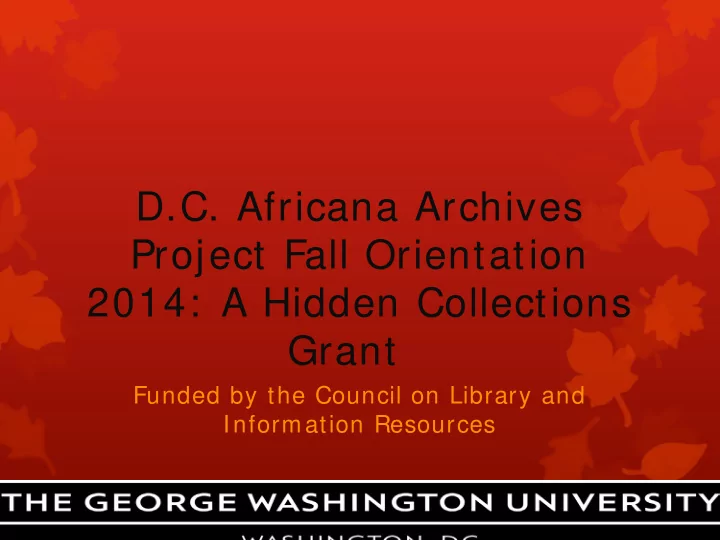

D.C. Africana Archives Project Fall Orientation 2014: A Hidden Collections Grant Funded by the Council on Library and Information Resources
DCAAP: Mission & Vision Mission The mission of the D.C. Africana Archives Project is to process and provide access to collections representing Africana history in the District of Columbia. Vision The site partners affiliated with the D.C. Africana Archives Project envision a consortium of institutions building research bridges and bringing together scholars, teachers, cultural centers, and communities to examine Africana life and culture.
DCAAP: Grant Refresher DCAAP is a grant funded by the Council on Library and Information Resources’s Hidden Collections initiative. DCAAP consists of six institutions: District of Columbia Archives D.C. Public Library, MLK, Jr. Memorial Library The George Washington University, Special Collections Historical Society of Washington, D.C. Moorland-Spingarn Research Center at Howard University Smithsonian National Museum of American History
DCAAP: Grant Refresher Grant Goals Process 125-150 collections related to Africana history and culture in Washington, D.C. Provide access to processed collections to enhance the understanding of the multiple narratives of the history of this region. Increase the amount of local history presented by teachers in the classroom using the historical narratives in the processed collections. Attract and inform students of all classifications, K-12 and collegiate, of the significance of Africana history. Engage communities through public programming and educational outreach.
Critical Content: DCAAP’s Historical Contribution The collections selected for this project date from 1790 to 2004, and relate to the Civil Rights Movement, Washington, D.C. politics, slavery, African American literature, local music and education reformers. The materials include land and property deeds, photographs, audio and video recordings and original manuscripts. Sample Collections: Walter E. Washington—Howard University Dizzy Gillespie Collection—National Museum American History Dorothy Provine Free Black Research Collection Capital Photo Service Collection Walter Fauntroy—GWU Engineer Department Records—D.C. Archives
Critical Content: DCAAP’s Historical Contribution The collections selected for this project interpret Africana history in a variety of ways: Demographics Manuscripts Photographs Land Deeds Oral Histories
DCAAP Survey Visits BEFORE SURVEY VISITS: How does your institution serve up finding aids? What description standards do you use? Do you have any survey information that would be useful for us? (accession records, shelf reads, background/ historical information)
Training Goals Process approximately 125 collections across 6 institutions Processing assistants will be able to use minimal processing techniques on collections ranging from the 18 th -20 th century Processing assistants will understand the concepts of provenance, original order, arrangement, hierarchies, and descriptive standards Hands-on exercises DACS exercise Processing small collections from SCRC at GWU Processing assistants will be given processing manuals based on those used in the Black Metropolis Research Consortium project
Training Schedule All students will receive processing training. Student processing training will begin November 3-14, 2014. There will be 2-3 training sessions per week, as well as seminars throughout the academic year. Partners are welcome to sit in on trainings and encouraged to share their expertise! Students will conduct site visits during the weeks of November 10 th and November 17, 2014.
Student Placement The interview process and training sessions will help determine where we station the students. Schedules Interest in subject areas Special skills (photographs, etc.) Please let us know if you have specific needs for the processing assistants at your institution
DCAAP Website The DCAAP website will support the development of online finding aids for greater public access. Project staff and students will also publish blogs about their experiences processing the collections. The DCAAP website will also link to all of the partner site websites in order to increase the traffic flow to the materials and information posted online. As we continue to develop the website, we will be in contact with each site in order to create the most useful online presence for the project.
Community Connections: Processing Workshops The grant requires that the project develop and implement at least two processing workshops. In the fall of 2015 and again in the spring of 2016, GW will host community processing workshops aimed at small collecting institutions and the community members at large. The partner sites will participate in facilitating and hosting the processing workshops in collaboration with GWU.
Educational Commitment: Curriculum Development Beginning in the fall of 2015, professors at the university level and teachers in K-12 systems will implement curriculum based on the collections processed through DCAAP . Students will be expected to make use of the collections at all of the partner sites, and encouraging them to explore and examine local history throughout their academic journeys. School Without Walls Africana Studies Program, GWU Columbian College of Arts and Sciences
Institutional Collaborations: DCAAP Partner Sites One of the major goals of DCAAP is to foster relationships in the cultural center, academic and library communities. In addition to processing collections, DCAAP partner sites will collaborate for research projects, publications, public programming events, and community outreach projects. Scholar Lectures Day Conferences Creative & Fine Arts Events K-12 Programming Joint Publications & Newsletters
Timeline Review Revised Calendar: July-October 2014—Planning & Personnel November-December 2014—Student Training & Placement January 2015-January 2017—Processing & Programming February-March 2017—Final Reporting
Questions & Answers
Recommend
More recommend